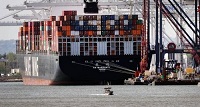 The UAE is among the top 12 countries in the World Bank’s Logistics Performance Index, which shows that adopting digital technologies in supply chains, especially in emerging economies, can help countries reduce delays at ports by up to 70 per cent compared to those in developed nations.
The UAE is among the top 12 countries in the World Bank’s Logistics Performance Index, which shows that adopting digital technologies in supply chains, especially in emerging economies, can help countries reduce delays at ports by up to 70 per cent compared to those in developed nations.
Opting for environmentally-sustainable logistics options can also lessen the carbon footprint of supply chains and keep trade flowing by shifting to less carbon-intensive freight and more energy-efficient warehousing, the Washington-based lender said in its Logistics Performance Index 2023 report.
According to The National, demand for green logistics is on the rise, with 75 per cent of shippers looking for environmentally-friendly options when exporting goods to high income countries, the report found.
The Logistics Performance Index, a measure of countries’ ability to move goods across borders with speed and reliability, covers 139 nations.
It measures the ease of establishing reliable supply chain connections by looking at factors such as the quality of logistics services, trade- and transport-related infrastructure and border controls.
In the 2023 LPI, the top 12 scorers are high-income economies, with the UAE making it to the list, the report said.
Singapore, with a score of 4.3, is at the top, a position it also held in 2007 and 2012.
Of the top 12 scorers, eight are in Europe, with Finland scoring 4.2; Denmark, the Netherlands, and Switzerland all scoring 4.1; and Austria, Belgium, Germany, and Sweden scoring 4.0.
The UAE, Canada and Hong Kong also ranked among the top 12, on a score of 4.0, the index showed.
“While most time is spent in shipping, the biggest delays occur at seaports, airports, and multi-modal facilities. Policies targeting these facilities can help improve reliability,” said Christina Wiederer, senior economist with the World Bank Group’s macroeconomics, trade and investment global practice and the report’s co-author.
These policies include improving clearance processes, investing in infrastructure, adopting digital technologies and incentivising environmentally-sustainable logistics, the World Bank said.
The average dwell time, or the time containers spent in ports, between May and October last year, was three days for India and Singapore and four days for the UAE and South Africa, but seven days for the US and 10 for Germany.
Emerging economies tend to have shorter port delays than industrialised economies, possibly because of the lingering effects of the 2021-22 supply chain crisis, the effects of Russia’s invasion of Ukraine on logistics in Europe, and the leapfrogging of richer economies in port productivity and digitalisation of end-to-end supply chains, the report found.
The Covid-19 pandemic-induced disruptions to shipping and the resulting global supply chain crisis created a challenging operating environment for companies.
Disruptions of global value chains have underscored the crucial importance of logistics systems, with supply chain resilience and its related national security implications emerging as top concerns for governments.
Geopolitical instability in Europe and continuing trade tensions between the US and China are also weighing on supply chains and world trade flows.
Logistics services were “broadly resilient” for both the top performers and bottom performers in the Logistics Performance Index, despite a more challenging operating environment, the World Bank said.
The top 10 countries with the best logistics performance continued to offer high-calibre services — rated 4.1 out of 5 on average compared with 4.0 in 2018.
The average rating of the 10 worst performers did not fall, despite challenging circumstances, and remained at 2.1 out of 5, as in 2018.
The bottom 10 scorers were mostly low- and lower-middle-income countries. They are either fragile economies affected by armed conflict, natural disasters and political unrest, or landlocked countries challenged by geography or economies of scale in connecting to global supply chains.
Afghanistan and Libya had the lowest score (1.9), followed by Somalia (2.0) and Angola, Cameroon and Haiti (2.1). (NewsWire)
